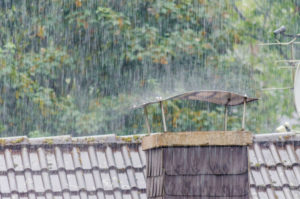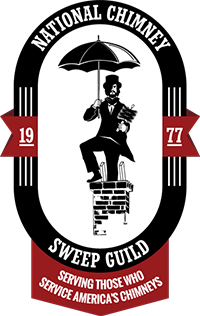When you think of using your fireplace, cold winter nights usually come to mind. Winter seems like the ideal time to use your fireplace; however, it’s also great to use to get the chill out of the house on autumn nights and cool spring evenings. That being said, if you’re using your chimney in the spring, you might notice that your chimney is having problems, especially leaks as the rainy season is here. When leaks appear, the best time to fix them is in the spring.
 The Problems Water Causes
The Problems Water Causes
When the mortar between the bricks or stones breaks down, not only can the exterior of your chimney be damaged, but the interior can be damaged as well. According to CSIA, all masonry chimneys are susceptible to the weathering that occurs from being exposed to outdoor elements such as rain, snow, and sleet. Although the stones in stone chimneys aren’t as likely to be affected as bricks are, the mortar that holds the stones together is. The CSIA website also states that when your chimney leaks, several things can be damaged. Some of these problems could include a deteriorating central heating system, stained chimney exterior, rusted damper assembly, and stained ceiling and walls. It can also cause the chimney lining to break down, and if the mortar has already deteriorated and cracked, that can mean that some of the gases that are released during combustion could be sneaking back into the house, where they can cause health issues for you and your family. If you suspect that your chimney is leaking, give Chim Cheroo Chimney Service a call so we can repair it before it causes further damage!
How Water Causes Problems
Rain, sleet, or snow can cause some big problems for your mortar chimney. Precipitation can wear away at your mortar, but even worse is the freeze/thaw cycle. During this cycle, water will seep into the porous mortar and even into the surface of the brick and sit there until the temperature drops to freezing. When water freezes, it expands. This causes cracks to appear where there used to be just pores. When it melts, those cracks fill in with liquid again, and the cycle continues. These cracks can cause big problems. There are other problems that can make your chimney leak as well. It could be the flashing those sheet metal strips that keep the junction where your chimney and roof meet tight. Sometimes the flashing leaks because it wasn’t properly installed, and sometimes it just wears out over time, rusts due to precipitation, or becomes torn in heavy winds. Whatever the reason, this can cause leaks.
Another place that is susceptible to leaks is at the top of the chimney, at the chimney cap or the chimney crown. The crown, which is the topmost built-on piece of the chimney, is designed in a way to keep the rain away from the area where the roof meets the chimney. It’s made of cement, so it could also be affected by the freeze-thaw cycle. If this happens, it does need to be repaired so that the leaks are stopped before they even start. The chimney cap, which sits on top of the chimney crown, is actually designed as a roof over the chimney opening, and it directs precipitation to the sloped edge of the chimney crown. If this gets rusty or damaged, it will allow precipitation to enter into the chimney as well.
Sometimes you may be thinking that your chimney is leaking, but it could be that this isn’t the case at all! It could actually be your roof. Chimney.com states it like this: “Often the water enters the roof several feet away from the chimney and then collects at the point where the chimney meets the roofing material and appears to be a chimney leak.” The best solution to a roof leak is to have your roof repaired or maybe even replaced. If you’re wondering if it’s your roof and not your chimney, we can check that out as well.
Signs of Leakage
If you’re wondering if you have a leak, take a close look at your chimney. If you notice that the mortar or even the bricks look crumbly or weak, or if there are flecks and little pieces of mortar or brick on the ground around the chimney, these can all be signs of spalling, which is another sign that you have leaks. Spalling is the process of water that is in your bricks or the mortar that holds your bricks together working its way to the surface, causing pieces to break away or pop off, which leaves these materials weakened.
What Can Be Done?
One way to ensure a leak-proof chimney is waterproofing. At Chim Cheroo Chimney Service, we will coat your chimney with a water repellent substance called ChimneySaver. Using the proper waterproofing system prevents water molecules from entering the brick and mortar while allowing vapor produced by combustion to exit your masonry. We know that ChimneySaver is the best product available to allow both these things to happen, and for our customers, only the best will do!
Whether you need a new chimney or chimney repairs from water damage, springtime is a great time to have these repairs done. A great place to call to take care of any work that needs to be done, whether it’s inspection, cleaning, or repairs, is Chim Cheroo Chimney Service. We’ll give the best service you can ask for and make sure that the job is done right!


